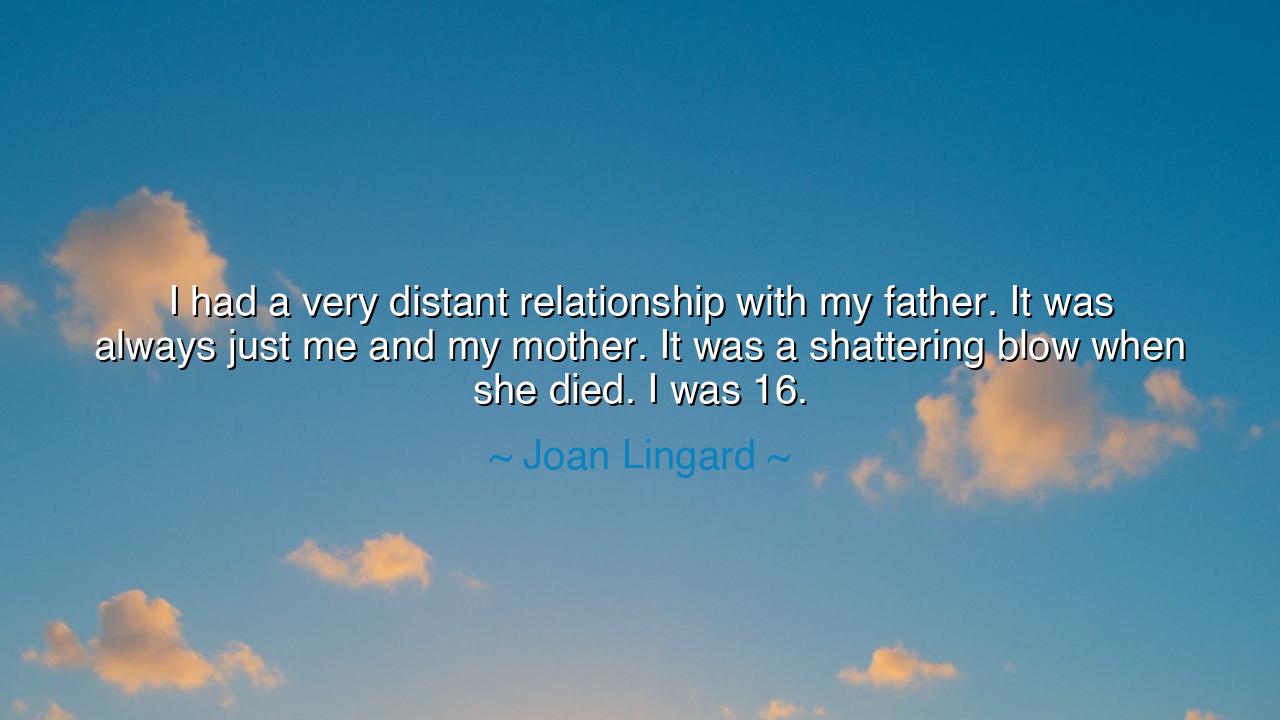
I had a very distant relationship with my father. It was always
I had a very distant relationship with my father. It was always just me and my mother. It was a shattering blow when she died. I was 16.






The wise storyteller Joan Lingard speaks with a voice touched by sorrow when she declares: “I had a very distant relationship with my father. It was always just me and my mother. It was a shattering blow when she died. I was 16.” These words carry the weight of personal tragedy, revealing the fragile bonds that shape a soul and the deep wound left when the one constant presence in life is suddenly taken away.
A distant relationship with a father leaves a child wandering, yearning for guidance and recognition that never fully comes. In such emptiness, the mother becomes the singular pillar of strength, the source of love and stability. For Joan, her world was built upon this sacred bond, a fragile sanctuary that shielded her from the loneliness and confusion of youth. When one parent alone bears the burden of nurturing, the connection between mother and child grows profound, like roots clinging tightly to a single rock in a storm.
But when death struck, it came as a shattering blow, breaking not only the bond of life but the foundation of her very being. At the tender age of sixteen, when the heart is still forming and the path ahead is uncertain, such loss is like the sudden extinguishing of a guiding star. In that darkness, grief becomes a harsh teacher, forcing the soul to grow before its time, to seek strength from within where none had been before.
This confession reflects the ancient truth that our earliest relationships shape the course of our lives. To lose the one who nurtured and understood us is to face a void that echoes for years to come. Many poets, sages, and storytellers have spoken of such loss, for it is a universal pain that unites all humanity across time and place. Lingard’s words are both personal and timeless, a reminder of the fragile threads that connect parent and child.
Thus, let this teaching endure: cherish those who stand beside you, for their presence is more precious than gold or glory. And when loss comes—as it surely will—allow grief to carve depth into the soul, transforming sorrow into wisdom. For even in the deepest darkness, the love once shared remains, guiding silently like a star hidden behind the clouds.






L8Tran Ngoc Minh lop 8d
Lingard’s story about losing her mother at 16, after already having a distant relationship with her father, brings up a lot of questions about grief and resilience. How does one begin to heal from that kind of loss? It makes me wonder how Lingard found ways to rebuild her life, relationships, and sense of self after such an emotionally formative experience. What kind of support or coping mechanisms did she lean on after that loss?
NVBinh Nguyen van
Joan Lingard’s reflection about her mother’s death at 16 is so poignant. It’s easy to imagine how losing the only person she was close to at that age would have a lasting effect. The emotional isolation that must have followed is hard to fathom, especially with a distant father. How do you process grief at that age when the one person who understands you is gone, and you don’t have much of a support system left?
TLTrang Le
Lingard’s words about the distance between her and her father, followed by the loss of her mother, really emphasize how early trauma can shape our future relationships. How does someone cope with that level of abandonment at a young age? Do you think her experience influenced her ability to connect with others later on, or did it make her more guarded? It’s hard to imagine how she navigated such a complex emotional landscape at 16.
HHHuong Ha
Lingard’s experience resonates with the feeling of losing a primary source of support, especially at such a vulnerable age. The emotional weight of losing a mother at 16, especially when the relationship with her father was distant, must have been incredibly isolating. How does that kind of loss shape one's ability to trust or connect with others in the future? How do you rebuild after such a significant loss?
GDGold D.dragon
Joan Lingard’s reflection on losing her mother at such a young age highlights the profound impact of that loss. To lose the one person who was your constant, especially at 16, must have been devastating. How does one begin to cope with such a loss when they’ve also experienced a distant relationship with their father? It makes me wonder how Lingard’s relationship with her father evolved after her mother’s passing, or if it remained strained.